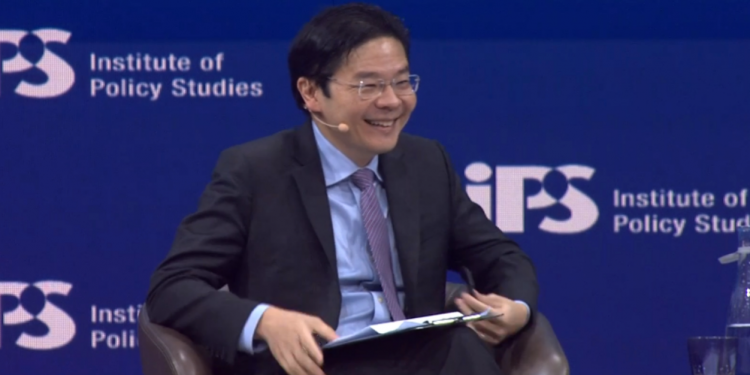During a 30-minute speech at the Singapore Perspectives 2021 conference, Education Minister and Co-chair of the Multi-Ministry Taskforce Lawrence Wong addressed various issues about the COVID-19 pandemic and Singapore’s future. Here’s a quick recap of what he said:
COVID-19 pandemic could last 4 to 5 years
Firstly, Mr Wong stated that it may take four to five years before the COVID-19 pandemic ends and for the world to look to a “post-COVID normal”.
“What will this new post-COVID world look like? No one can tell,” he said.
He highlighted how there were still many uncertainties to contend with in the next few years, and said that adhering to safe management measures such as mask-wearing and avoiding crowds will continue for this year and “maybe a good part of next year”.
“Beyond that, the availability of COVID-19 vaccinations will progressively restart global travel, but getting the world vaccinated won’t be quick or easy,” he added.
Although vaccines are now available, Mr Wong noted that it may not be so effective against new mutant strains of the virus, and that the vaccines will have to be modified to counter them.
“In the positive scenario, this means the vaccine becomes a bit like an annual flu jab… or perhaps we develop a vaccine that works for all strains. But in the worst case, we end up always a step behind an evolving virus, and you will not be able to catch up in time,” he said.
“So there are still tremendous uncertainties ahead of us. And the bottom line is that we live in a shared world and no one is safe until everyone is safe.”
READ: One Year On for COVID-19: How One Pandemic Brought the Whole World to a Standstill
Rise in imported cases not due to more travellers entering Singapore
In response to a question about how Singapore plans to manage the risk of imported cases, Mr Wong explained that the increased numbers are not the result of more travellers entering the country, but rather due to the higher infection rates overseas.
“Why have the numbers gone up? It’s simply because the prevalence rate, the incidence rate, of the disease is much higher now. The virus is raging in countries everywhere.”
He further elaborated that the largest source of travellers remain construction and foreign domestic workers, but the number of these workers entering Singapore has not risen “in recent times”.
Although these travellers are required to take a pre-departure test 72 hours before they arrive. “But the nature of these sorts of tests is that they are not foolproof,” Mr Wong said, adding that some people may initially test negative while the body is incubating the virus.
That is why, he said, these travellers have to serve stay-home notices of 14 days, or up to 21 days for certain countries, to quarantine them from the community. “Those are precautions that we have been taking all along and we will continue to take… even as we have a continuous flow of people coming in, which is needed for Singapore’s economy and society to function,” he added.
READ: Busting Covid-19 Vaccine Myths
100% work from home not doable
During the forum, Editor-in-chief of The Straits Times, Warren Fernandez posed a question to Mr Wong regarding Singapore’s future in light of the pandemic.
In response, Mr Wong said that although the recent rise of cases in the community may seem similar to what happened in 2020, he stressed that there were “important differences” that should be recognised — which include higher testing, contract tracing capabilities, as well as the availability of vaccines.
“There may be some sacrifices that are still needed from time to time, we still will need restrictions. But let’s get through this stretch, get everyone vaccinated, and we should be in a much better situation after that,” he said.
Mr Fernandez subsequently asked a follow-up question related to the idea of ‘reset’, which has been the main focus of this year’s IPS conference.
In response, Mr Wong replied that the pandemic did not introduce new disruptions, but rather accelerated existing trends. He brought up Singaporeans’ use of technology as an example, mentioning that hybrid arrangements in workplaces have been talked about for a long time, before becoming the new normal during the pandemic.
So this begs the question: Will fully working from home still be possible even after the pandemic?
According to Mr Wong, a 100 per cent work from home arrangement is “not doable”. He explained, “You cannot function effectively without that human collaboration and that social interaction. So you do need a chance for people to come together.”
However, he maintained that things do not have to go back to pre-pandemic status, and that there is room for a paradigm shift in this area — such as for companies and employers to embrace flexible or hybrid working arrangements in the future.
On the ‘golden age of ignorance’ and COVID-19 ‘armchair epidemiologists’
Mr Wong also shared that a silver lining of the pandemic was the opportunity to strengthen social solidarity within the fabric of Singaporean society.
Before COVID-19, he said that there were “powerful forces chipping away at social cohesion”, both in Singapore and other countries. He made reference to the “significant minorities” around the world who think that the pandemic is a hoax, noting that it was a great irony, as information is easily accessible.
“And so the irony is despite the overwhelming ease of access of information, we are living as some would say in a golden age of ignorance,” he said.
Mr Wong also touched on the emergence of online “experts” during the pandemic.
“We are also seeing the downgrading of expertise. Because experts are seen as out-of-touch elites, and expert knowledge is sometimes portrayed negatively as a conspiracy by the elites to perpetuate their dominance… And with easy access to information, everyone can claim to be an expert. Let’s look at how many armchair epidemiologists have emerged during this crisis. Virtually everyone thinks they can say something intelligent about how the virus spreads,” he said.
Despite this, he acknowledged that the existence of these pseudo-experts also encourage healthy questioning of expert advice. However, he also cautioned against disregarding expertise or self-selecting information to reinforce one’s own point of view without seeing things from another perspective.
To end off, Mr Wong reiterated that he was confident that Singapore will “prevail and emerge stronger from this crucible”.
Join the conversations on THG’s Facebook and Instagram, and get the latest updates via Telegram.














